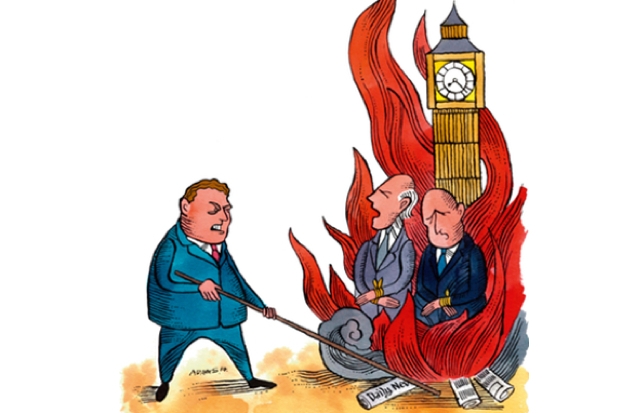Harvey Proctor has done us all a favour. His press conference last week about the hysterical allegations being made against him by ‘Nick’ (an anonymous bloke) and the paedo-obsessed police has helped expose the medieval madness of the post-Savile paedophile panic.
Proctor has been accused of torturing and murdering boys at wild Westminster sex parties that were also frequented by Edward Heath and Leon Brittan. If you believe that, you’ll believe anything. From stories about Jews sacrificing Christian kids and drinking their blood, to that great unhinged moment in the 1980s when working-class families were torn apart by social workers and feminists who believed they were capable of sacrificing animals, raping their children and, in the words of Beatrix Campbell, ‘shitt[ing] on silver trays and mak[ing] the children eat it’, baseless whispers about the ritualistic murder of kids often appear during moments of social madness. And Britain is truly experiencing a moment of social madness. The Savile scandal has nurtured an ugly climate, where half-baked claims against any old celeb or politician are taken seriously and splashed across the papers, aided and abetted by police forces that have lost the plot and publicity-hungry politicians who stand up in parliament to say ‘I have evidence of a Westminster paedo ring!’ By which they mean some former drug addict phoned them once and claimed to have been tortured by a Tory. In listing the obviously bonkers accusations made against him, Proctor has drawn attention to the Dark Age streak to this hysteria. Good for him. He’s drawn attention to something else too: the anti-gay aspect of the paedo panic. Proctor says he’s the victim of a ‘homosexual witch-hunt’. I think he’s right. From that strange episode in the early 2000s, when various celebs were arrested for having sex with male teenagers in the 1970s, to the current whispers about Heath (‘he was gay, you know!’), Cliff Richard (‘we all know about him’), and now Proctor, there’s a more than a whiff of homophobia to this social madness. David Cameron alluded to this in 2012, when Phillip Schofield, playing daytime TV’s Witchfinder General, shoved a list of alleged paedos under his nose. Cameron said: ‘There is a danger, if we’re not careful, that this could turn into a sort of witch-hunt, particularly against people who are gay.’ That’s happening.Right from the 1970s, the modern paedophile panic has had a homophobic element. Indeed, it was stoked in large part by Christian evangelicals pissed off that, in an increasingly liberal era, they could no longer fearmonger about predatory homosexuals like they did in the 1950s. The decriminalisation of gay sex in the 1960s, and the rise of gay liberation in the early 1970s, made it difficult for certain moral entrepreneurs to spread their black-and-white propaganda about homosexuals warping the next generation. Through the spectre of The Paedophile, however, they could keep pushing their fear of gay deviancy.
The social historian Philip Jenkins described it as ‘the politics of substitution’. He said groups that were opposed to men having it off with each other, or to the availability of porn, found themselves in a sticky situation in the post-1960s climate, ‘which emphasised the freedom of consenting adults to determine their private moral conduct’. So they substituted their old-fashioned morality with a new-fangled concern for the fate of vulnerable children. As Jenkins says, in the 1980s ‘we find morality campaigns directed not against homosexuality, but against paedophilia; not so much against pornography in general, but child pornography’. The at-risk kid became a moral shield for those who felt they could no longer openly state their prejudices. The paedo panic has its origins among American Christians who in the 1970s founded groups like Save Our Children, which warned that ‘particularly deviant-minded’ people in the Scouts or schools might ‘sexually molest children’. These evangelicals were later joined by radical feminists — the motliest crew of modern times! — whose big concern was not homosexuals but men in general. And so the paedo panic was born, midwifed by God-botherers and men-haters, exploding with force in the 1980s, staggering on through tabloid scare stories in the 1990s, and now taking the form of a full-on conspiracy theory about powerful men murdering children. And probably drinking their blood. That’s what gays do, right? Or is it Jews? It’s hard to keep up with the hysterias. ‘Politics of substitution’ — that’s what everyone is doing. Incapable of having a rational debate about morality in the 21st century, about what we stand for as a society, instead we reach for the substitute of The Paedophile: the all-purpose bogeyman for folks who really want to bash gays, finger-point at the political class, spread panic about family life, or pursue some other ugly moralistic agenda under the guise of ‘saving children’.






Comments